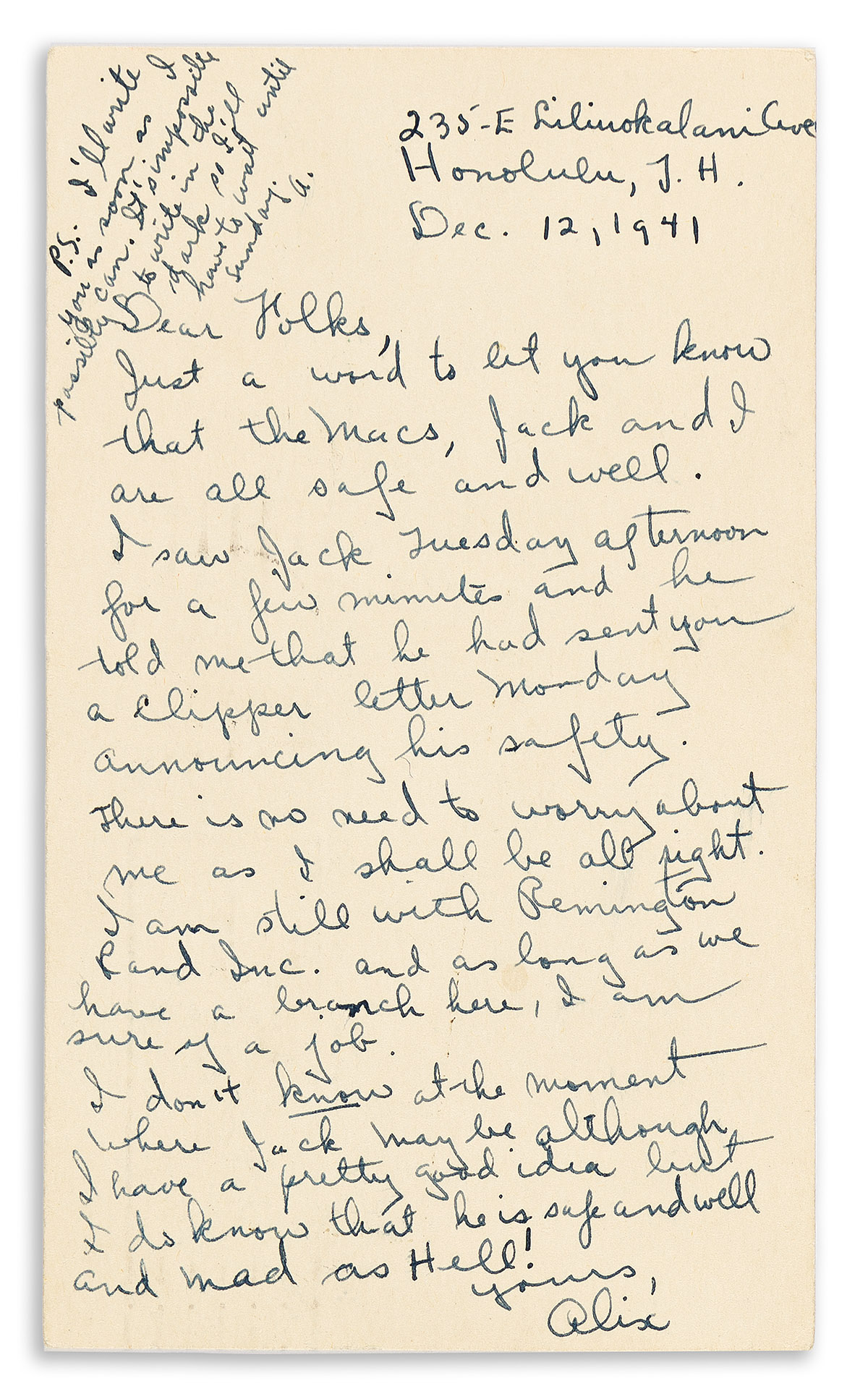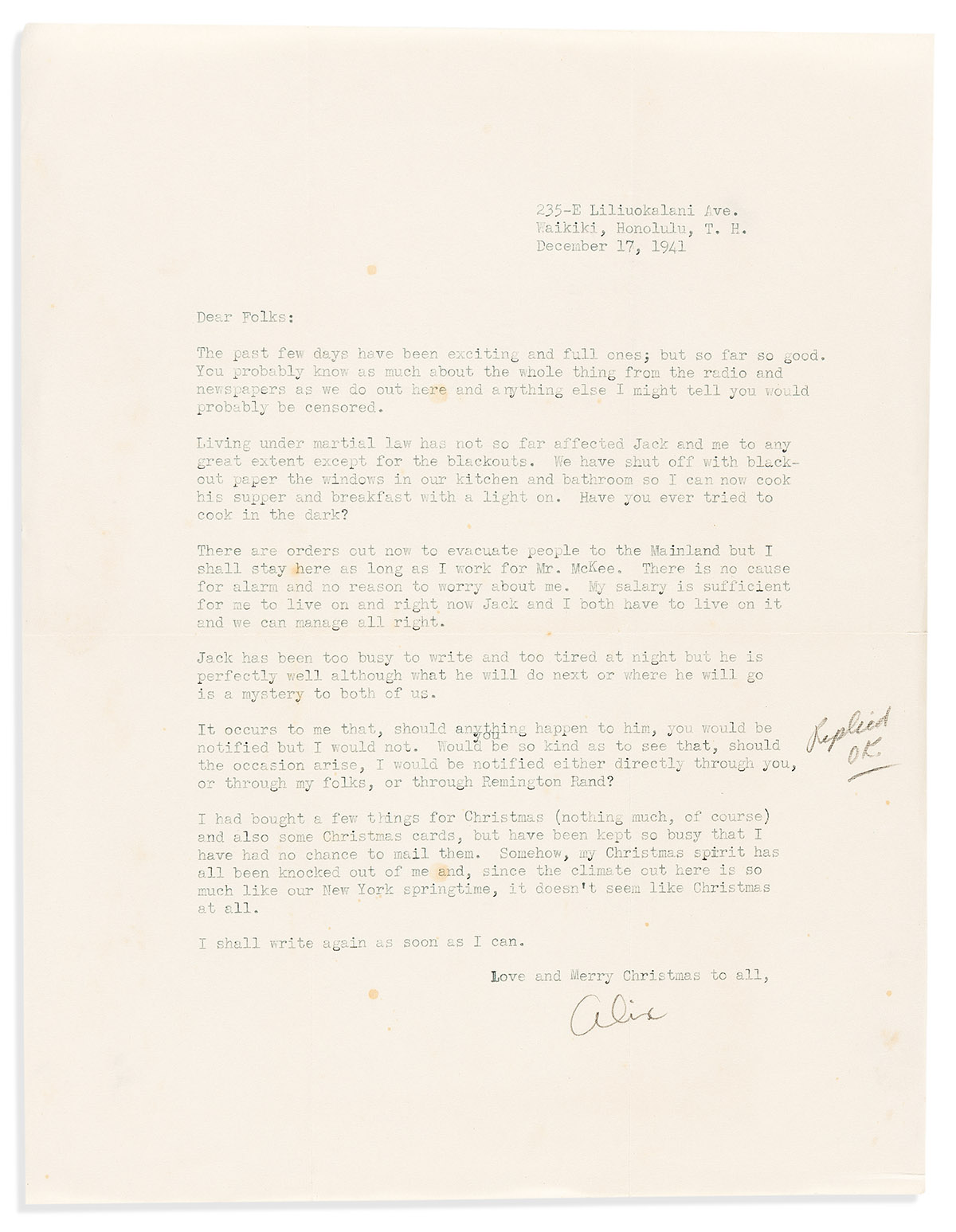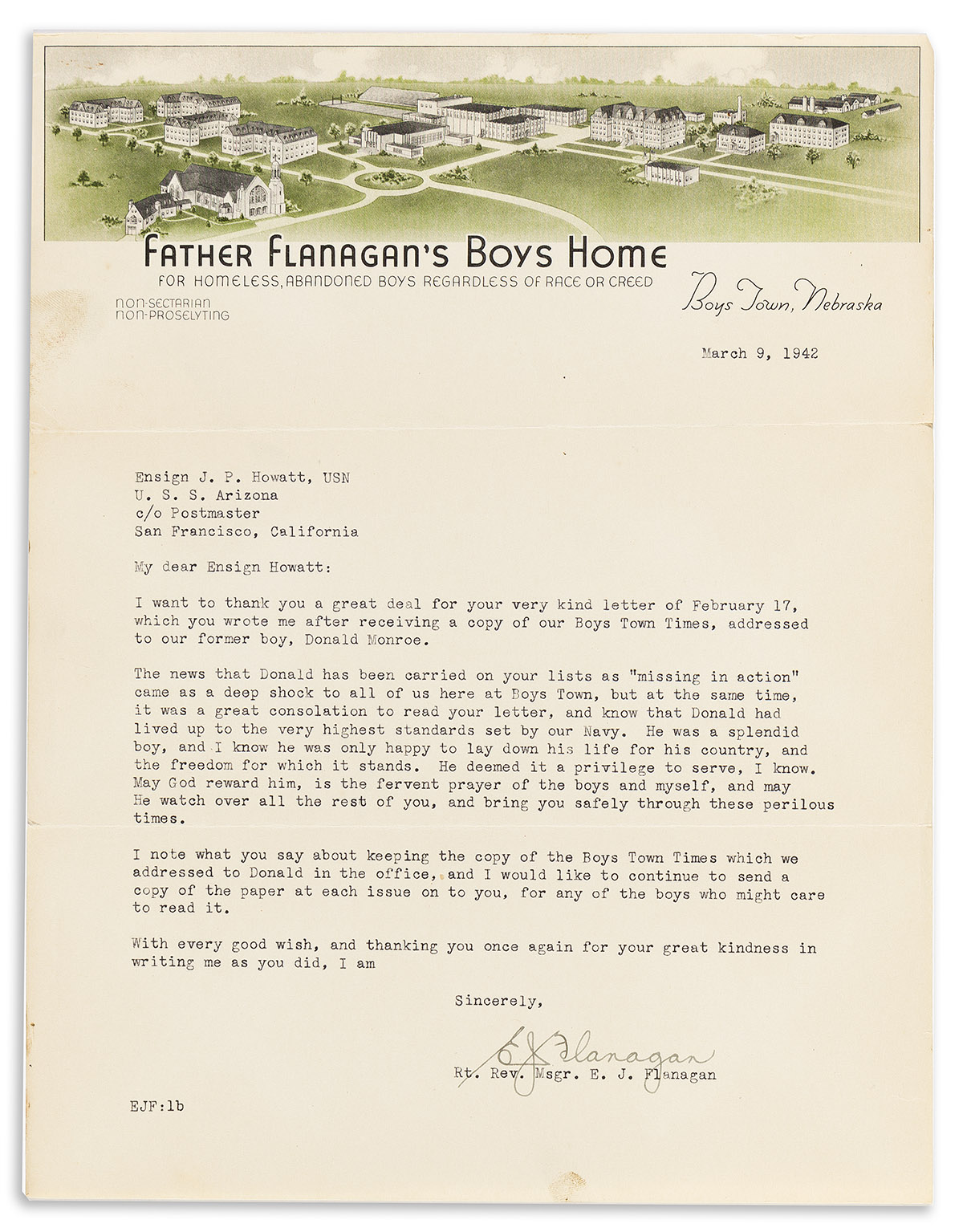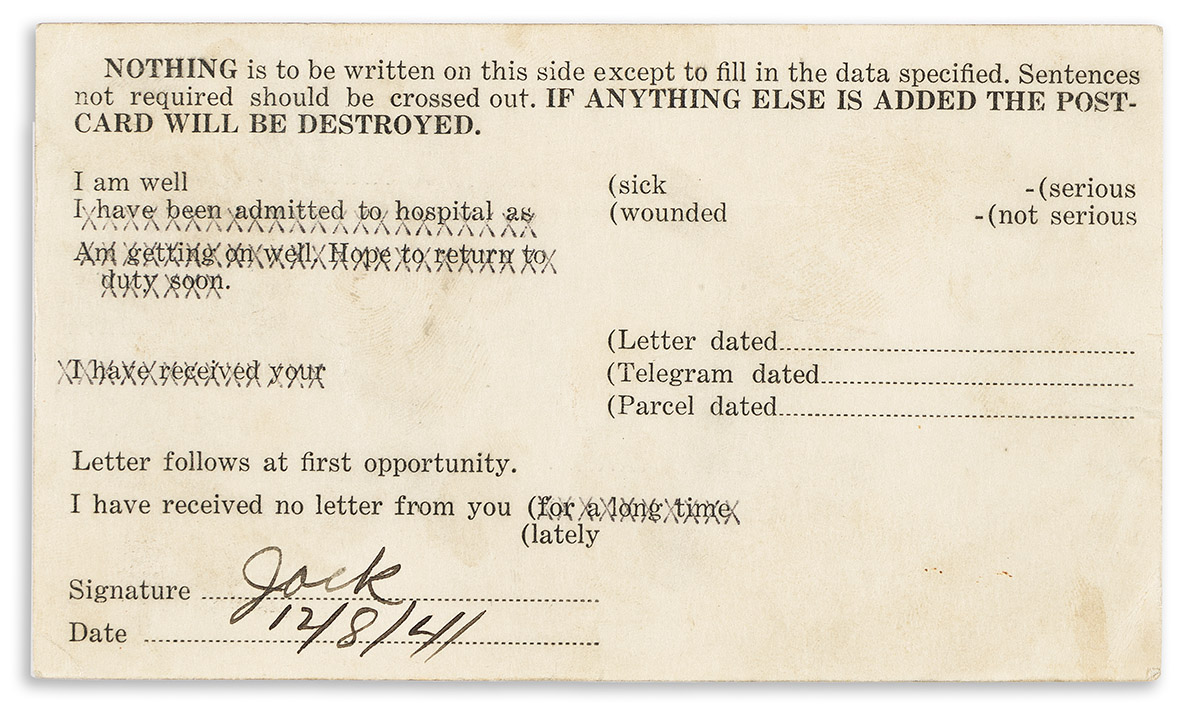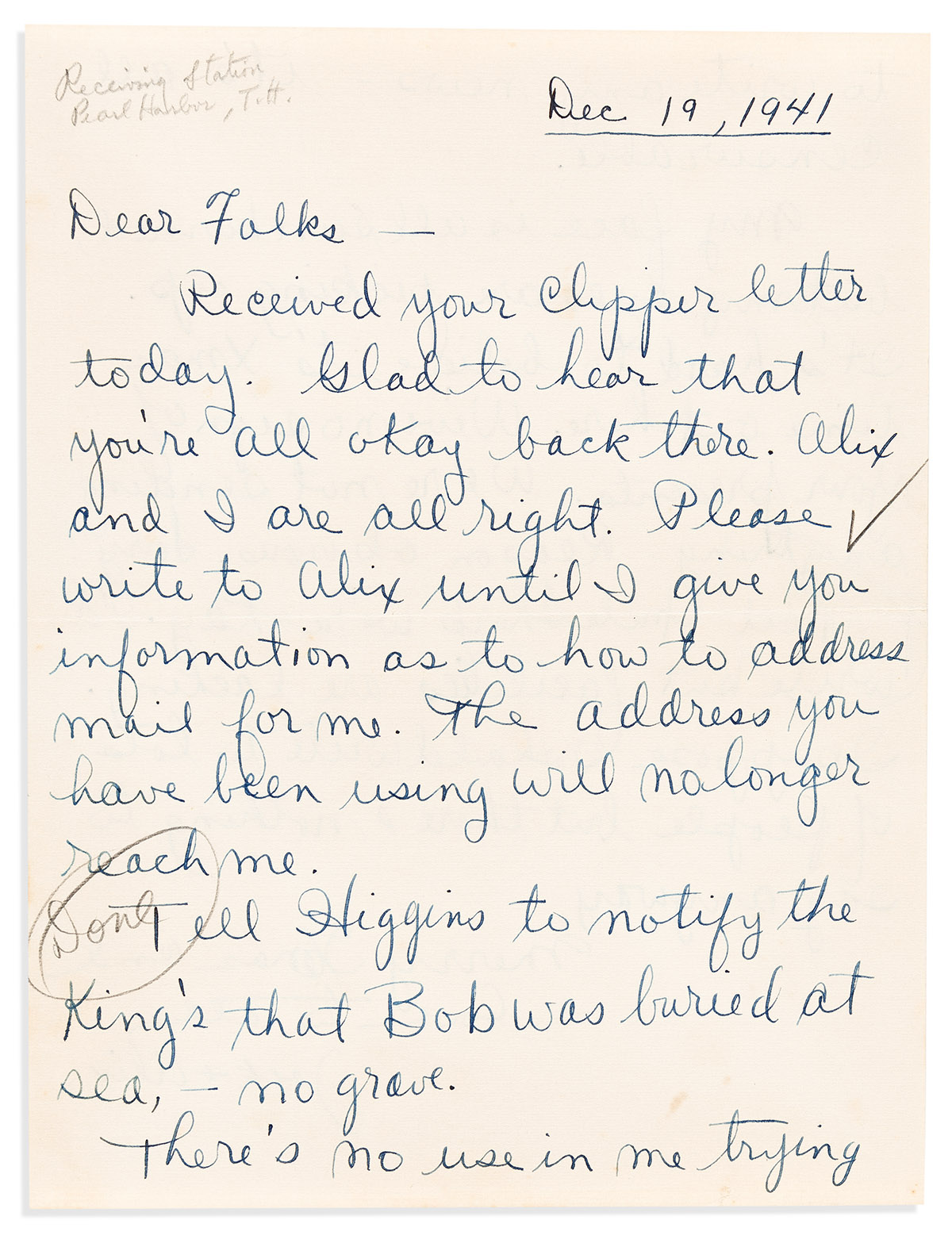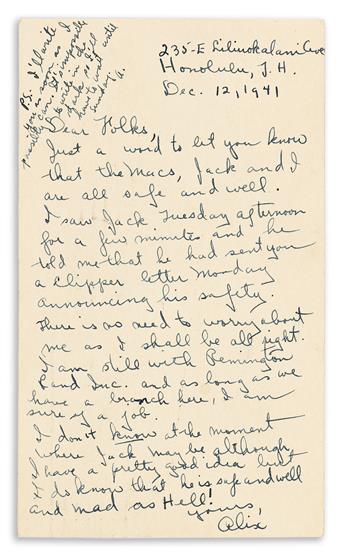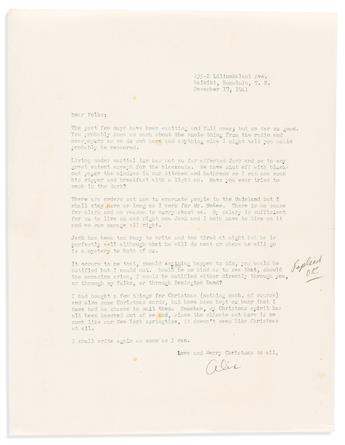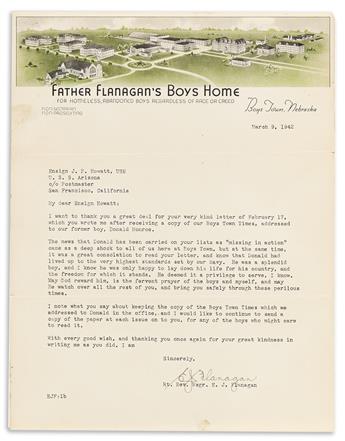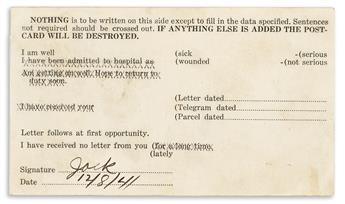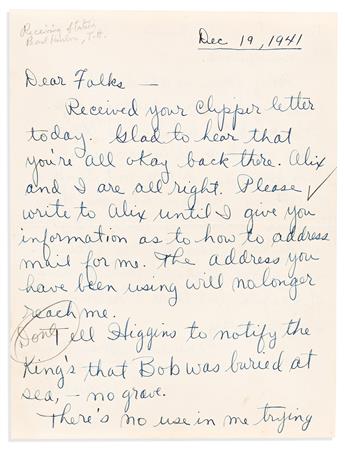Sale 2687 - Lot 260
Price Realized: $ 3,000
Price Realized: $ 3,750
?Final Price Realized includes Buyer’s Premium added to Hammer Price
Estimate: $ 3,000 - $ 4,000
(WORLD WAR TWO.) Extensive correspondence of Ensign John P. Howatt, one of the few survivors of the USS Arizona at Pearl Harbor. Several hundred letters and other papers (1.5 linear feet), condition generally strong. Various places, 1935-1987
Additional Details
"All our friends were either killed or evacuated since the 7th."
These are the papers of John Paul Howatt (1917-1987), who was born in Peking, China, where his American father was a banking executive. He joined the Navy in 1934, graduated from the United States Naval Academy in 1940, and reported to the USS Arizona in that year. He married Marie Alix Brunet in January 1941; she found work as a stenographer in Honolulu. The Arizona bore the worst of the Japanese surprise attack on Pearl Harbor on 7 December 1941, which killed 1,177 of the 1,512 men aboard. Ensign Howatt was one of the survivors.
This archive contains the extensive family correspondence between Howatt, his wife Alix in Honolulu, and his parents in Forest Hills, NY. While the collection begins with his early navy service and education, December 1941 is of course the place to start.
Howatt's last notes to Alix before the attack, postmarked 4 December, are sweet and banal: he is attending a Communication Officers conference; he wants to make sure the Christmas cards get in the mail. On 8 December, he sends out a pre-printed card to his parents stating only that "I am well," over his signature "Jack" with the 12/8/41 date, apparently provided to the survivors for hasty responses. Alix sends a telegram to another family member on the 10th: "Both safe, tell Howatts." She follows up with a postcard on the 12th to assure them: "I saw Jack Tuesday afternoon [9 December] for a few minutes. . . . I don't know at the moment where Jack may be although I have a pretty good idea, but I do know that he is safe and well and mad as Hell!" His mother writes on the 16th with distressing news--an old flame's stepfather was asking around, hoping that he was dead in the attack, so they could claim his estate! Howatt was urged to make sure his marriage to Alix was properly recorded. Alix writes her in-laws on the 17th describing life under blackout conditions, and apologizes that those Christmas cards are not going out on time. Jack sends his first full letter home on the 19th, adding one bit of news: "Tell Higgins to notify the Kings that Bob was buried at sea, no grave." On the 31st he adds a bit more: "Believe me, if there's ever any mopping up to be done by US forces around Tokio way, it'll be pretty thorough! . . . I lost every stitch of clothes I had, except a pair of pants and a polo shirt when the ship went down. I suppose I'll get some sort of compensation for it sometime in the distant future. . . . Don't think that I miss anything I lost; the fact that I'm still okay sort of makes up for that." The attack is frequently alluded to in the correspondence through early 1942, most poignantly on 2 March 1942 when Alix noted to her in-laws that they rarely entertained: "Not very often now, since all our friends were either killed or evacuated since the 7th."
Also included in a typed copy of his 31 October 1942 letter to "Aunt Sally and Uncle Sut." He disputes the press accounts of the Arizona sinking, insisting that it only happened because modern armaments had been diverted to help England: "She should not have been sunk at all! In Bremerton in 1940 (October) we installed mounts for 'pom poms.' The guns were not available because they were all being sent to Britain. On Dec. 7 1941--15 months later--these mounts were still empty! We had no automatic AA weapons. . . . Think that over, and see where the blame lies. No ship with automatic weapons was even moderately damaged!" He disputes that battleships have been made obsolete by aircraft carriers: "Used correctly, a battleship is still tops!! We'll need them in 1950!"
Howatt is named on the rolls of Arizona survivors, but he is most known to history for his communications with the families of the deceased. One of the fallen sailors was Steward's Mate Donald Monroe, an African-American who had spent time at the famous Nebraska orphanage, Father Flanagan's Boys Town. When a Boys Town newsletter arrived for Monroe in February 1942, Howatt took the time to write to Father Flanagan about Monroe's death, adding "Donald was proud of Boys Town. . . . If he is an example of the average boy from Boys Town, then I can easily see why our whole country is proud of Boys Town." We don't have that letter, but we do have Father Flanagan's response. Flanagan then made copies of Howatt's letter and distributed them in his fundraising appeals, making Howatt to some extent a public face of the Arizona survivors. Soon, Howatt was corresponding with parents of several other deceased Arizona sailors. One wrote "we are very thankful to you for letting us know that Bob was at his battle station when the blow fell." Another asked "Please let me know if you knew my son? You are the only one we have heard of that came through the attack." Howatt gathered another man's personal effects and sent them to the parents, and in return they asked that he make use of the deceased sailor's car for as long as he remained in Hawaii. Howatt kept a list of these family members across the country titled "People to see when possible," with some of them marked "Every effort to be made to visit these people."
Howatt was soon reassigned to service aboard the USS California as it was repaired from Pearl Harbor damage, then the USS Thompson in 1943, which served at D-Day. His letters from June 1944 allude to action around Normandy, though the censors prevented anything very specific. On 14 June 1944 he wrote "For a few minutes things are a little dull while we are waiting for our friend the enemy to make his first attack of the night. . . . He makes two or three a night usually, always at least one. . . . We are not sunk or damaged. We did our shooting from pistol range, but were not hit, thank God and your prayers." He finished the war after taking command of the USS Winslow on 12 July 1945, and retired from the Navy as a Commander in 1958, then taught high school mathematics.
With--4 folders of papers of father George Robblee Howatt (1889-1959), who was raised in South Royalton, Vermont, and in 1910 went overseas with the United States Civil Service as a Department of Education clerk in the Philippines. In 1916 he left to work as manager of the Peking (Beijing) office of the American-run International Banking Corporation through 1921 (see lot 132). Includes a folder of 47 letters and documents on Howatt's civil service career, including 3 letters of support from Senator Carroll S. Page of Vermont, 1910-1916; also files from his banking career in New York, Syracuse, and Boston, 1924-1960. Most notable is a typescript illustrated prospectus of a mercury mine in Texas, 1933.
These are the papers of John Paul Howatt (1917-1987), who was born in Peking, China, where his American father was a banking executive. He joined the Navy in 1934, graduated from the United States Naval Academy in 1940, and reported to the USS Arizona in that year. He married Marie Alix Brunet in January 1941; she found work as a stenographer in Honolulu. The Arizona bore the worst of the Japanese surprise attack on Pearl Harbor on 7 December 1941, which killed 1,177 of the 1,512 men aboard. Ensign Howatt was one of the survivors.
This archive contains the extensive family correspondence between Howatt, his wife Alix in Honolulu, and his parents in Forest Hills, NY. While the collection begins with his early navy service and education, December 1941 is of course the place to start.
Howatt's last notes to Alix before the attack, postmarked 4 December, are sweet and banal: he is attending a Communication Officers conference; he wants to make sure the Christmas cards get in the mail. On 8 December, he sends out a pre-printed card to his parents stating only that "I am well," over his signature "Jack" with the 12/8/41 date, apparently provided to the survivors for hasty responses. Alix sends a telegram to another family member on the 10th: "Both safe, tell Howatts." She follows up with a postcard on the 12th to assure them: "I saw Jack Tuesday afternoon [9 December] for a few minutes. . . . I don't know at the moment where Jack may be although I have a pretty good idea, but I do know that he is safe and well and mad as Hell!" His mother writes on the 16th with distressing news--an old flame's stepfather was asking around, hoping that he was dead in the attack, so they could claim his estate! Howatt was urged to make sure his marriage to Alix was properly recorded. Alix writes her in-laws on the 17th describing life under blackout conditions, and apologizes that those Christmas cards are not going out on time. Jack sends his first full letter home on the 19th, adding one bit of news: "Tell Higgins to notify the Kings that Bob was buried at sea, no grave." On the 31st he adds a bit more: "Believe me, if there's ever any mopping up to be done by US forces around Tokio way, it'll be pretty thorough! . . . I lost every stitch of clothes I had, except a pair of pants and a polo shirt when the ship went down. I suppose I'll get some sort of compensation for it sometime in the distant future. . . . Don't think that I miss anything I lost; the fact that I'm still okay sort of makes up for that." The attack is frequently alluded to in the correspondence through early 1942, most poignantly on 2 March 1942 when Alix noted to her in-laws that they rarely entertained: "Not very often now, since all our friends were either killed or evacuated since the 7th."
Also included in a typed copy of his 31 October 1942 letter to "Aunt Sally and Uncle Sut." He disputes the press accounts of the Arizona sinking, insisting that it only happened because modern armaments had been diverted to help England: "She should not have been sunk at all! In Bremerton in 1940 (October) we installed mounts for 'pom poms.' The guns were not available because they were all being sent to Britain. On Dec. 7 1941--15 months later--these mounts were still empty! We had no automatic AA weapons. . . . Think that over, and see where the blame lies. No ship with automatic weapons was even moderately damaged!" He disputes that battleships have been made obsolete by aircraft carriers: "Used correctly, a battleship is still tops!! We'll need them in 1950!"
Howatt is named on the rolls of Arizona survivors, but he is most known to history for his communications with the families of the deceased. One of the fallen sailors was Steward's Mate Donald Monroe, an African-American who had spent time at the famous Nebraska orphanage, Father Flanagan's Boys Town. When a Boys Town newsletter arrived for Monroe in February 1942, Howatt took the time to write to Father Flanagan about Monroe's death, adding "Donald was proud of Boys Town. . . . If he is an example of the average boy from Boys Town, then I can easily see why our whole country is proud of Boys Town." We don't have that letter, but we do have Father Flanagan's response. Flanagan then made copies of Howatt's letter and distributed them in his fundraising appeals, making Howatt to some extent a public face of the Arizona survivors. Soon, Howatt was corresponding with parents of several other deceased Arizona sailors. One wrote "we are very thankful to you for letting us know that Bob was at his battle station when the blow fell." Another asked "Please let me know if you knew my son? You are the only one we have heard of that came through the attack." Howatt gathered another man's personal effects and sent them to the parents, and in return they asked that he make use of the deceased sailor's car for as long as he remained in Hawaii. Howatt kept a list of these family members across the country titled "People to see when possible," with some of them marked "Every effort to be made to visit these people."
Howatt was soon reassigned to service aboard the USS California as it was repaired from Pearl Harbor damage, then the USS Thompson in 1943, which served at D-Day. His letters from June 1944 allude to action around Normandy, though the censors prevented anything very specific. On 14 June 1944 he wrote "For a few minutes things are a little dull while we are waiting for our friend the enemy to make his first attack of the night. . . . He makes two or three a night usually, always at least one. . . . We are not sunk or damaged. We did our shooting from pistol range, but were not hit, thank God and your prayers." He finished the war after taking command of the USS Winslow on 12 July 1945, and retired from the Navy as a Commander in 1958, then taught high school mathematics.
With--4 folders of papers of father George Robblee Howatt (1889-1959), who was raised in South Royalton, Vermont, and in 1910 went overseas with the United States Civil Service as a Department of Education clerk in the Philippines. In 1916 he left to work as manager of the Peking (Beijing) office of the American-run International Banking Corporation through 1921 (see lot 132). Includes a folder of 47 letters and documents on Howatt's civil service career, including 3 letters of support from Senator Carroll S. Page of Vermont, 1910-1916; also files from his banking career in New York, Syracuse, and Boston, 1924-1960. Most notable is a typescript illustrated prospectus of a mercury mine in Texas, 1933.
Exhibition Hours
Exhibition Hours
Aliquam vulputate ornare congue. Vestibulum maximus, libero in placerat faucibus, risus nisl molestie massa, ut maximus metus lectus vel lorem.



